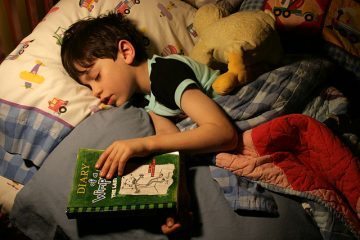Time For Bed: A Guide to Getting Your Kids Some Zzzz’s
As we all already know, a good night’s sleep is crucial for anyone, especially the kids. However, tucking your young ones to bed can be quite a challenge. So, how do you get them to catch some needed Zzzzs? This article will help you find out.
Why do your kids need enough sleep?
While there is still a lot of things yet to be understood about sleep and its mechanisms, scientists agree that it is an essential part of our life cycle. Not only does it help in repairing and reinvigorating our bodies, sleep is also used to regulate our body clocks, ensuring that all our internal biological processes are in sync and are occurring at the right time.
The above functions of sleep become even more important when we talk about kids. As their bodies are still under constant growth and development, proper sleep helps in ensuring that they grow healthy and are able to adapt to their environment better. Any sleep problem at this early stage in their lives not immediately addressed can also have an adverse effect on their well-being later on.
So how much sleep do your kids need?
As it is important for kids to get the right amount of sleep each day, knowing how much that amount should be is crucial. The exact amount of sleep needed by kids as well as their sleeping patterns changes considerably as they grow older. These are summarized below:
1. Newborns (0-3 months)
Newborns are expected to sleep round-the-clock, with them dozing off anywhere from 11 to 18 hours a day. However, the time when they are asleep can be irregular, varying from several minutes to several hours. Their moments of sleep are also irregularly interspersed with one to three hours of waking time.
When they need to sleep, newborns will cry, move around incessantly, or rub their eyes to draw attention. During sleep, they twitch their arms and legs, smile and suck their fingers, and move around a lot.
2. 4-11 months
At this stage, infants slowly start to settle into a more regular sleeping time, requiring 9-12 hours of sleep at night. They also commonly take one to four 30-minute naps throughout the day. At this point, nighttime feedings also become less common and they sleep continuously without waking up fo eat.
It is also at this stage when they slowly become “self-soothers”, meaning they are able to fall asleep without the need for assistance. However, there are also kids who would become “signallers” and would call out for their parents to put them to sleep.
3. 1-2 years old
Once children hit their first year, their sleep period will range from 11 to 14 hours a day. Their daytime naps will also decrease to around once, lasting from one to three hours
However, this also the point where toddlers become resistant to going to bed as they now become more socially active and independent. It is also here where they experience sleeping problems like nightmares, fears, and nighttime awakenings. Some can also suffer from separation anxiety.
4. 3-5 years old (preschoolers)
Preschool children usually sleep for 11-13 hours at night. By the time they reach their fifth year, their daytime naps become even less common, with many not napping at all. The sleeping problems encountered during the toddler years become more prevalent, as their growing imagination can bring up even more nighttime fears.
5. 6-13 years old (school age)
At this point, school-age kids need around 9-11 hours of night sleep. However, their increased physical and social activities both in school and at home will have an impact on their sleeping habits, with electronic gadgets and TV drawing their attention. It is also at this age group where other sleeping disorders, as well as behavioral conditions like ADHD, manifest their symptoms.
What are the common sleeping problems encountered by kids?
While there are a lot of sleep problems that can come up to kids, the following are the most common:
- Night waking-this is when your kids wake up at inappropriate times. While these are common for all kids, this can be a problem whey occur with increasing frequency. In most cases, night waking can be dealt with by talking to your child and addressing the night terrors that are causing them to wake up. Also, assure them that you are just there when they need you.
- Sleep onset association-this happens when your child associates another activity like being rocked or sucking a pacifier with sleeping. This can cause him to be hesitant to go to bed unless the associated thing is present. Training will play a big role in getting them to learn to let go of whatever object they are associating with sleep. You need to be firm in making sure they don’t get too attached to pacifiers and such.
- Resistance to going to bed-the above is just one reason why kids would not want to get to bed on time and there are still other reasons. This particular problem becomes more commonplace as they become more active. To get them to bed at the right time, you need to create a schedule that would fit in their activities, while still leaving enough room to prepare them for sleep. You might also want to have a heart to heart talk with them to find out why they don’t like going to bed and address their concerns.
- Parasomnias-this particular problem is not a single one but is more of a broad range of issues. They are usually not that serious but still can affect your kid’s sleeping patterns. As the symptoms of parasomnias vary a lot, the solutions will be dependent on the particular symptoms exhibited.
- Separation anxiety-unlike the other problems, this can affect not only your child but also yourself. You might feel uneasy not having them sleep by your side, in the same way they do you. This can lead you to check them from time to time, which can disturb their sleep. Discipline plays a big part in dealing with separation anxiety. Resist the urge to check on your kids frequently, especially if they themselves can sleep even without assistance.
How do you get your kids the right amount of sleep?

1. Set up the right sleeping environment
A room’s lights can disrupt your kid from dozing up by disrupting the regulation of certain hormones. Thus, the best way for your kid to sleep soundly is when they are in total darkness. For kids who can’t sleep with all the lights off, use a small nightlight placed near the door and turn it off once they have fallen fast asleep.
2. Set the right sleep and wake up time
As kids reach the preschool age, they begin to settle into regular sleeping patterns. However, even here, each child will have his or her own individual pattern. Observe this carefully so that you can determine at which time it would be best to put them to bed and ensure that they get the right amount of sleep hours they need.
When it comes to setting up wake up times, you should avoid letting the child awake later during weekends. These can cause disruptions in their body clocks which can lead to difficulty in sleeping during weekdays.
3. Remove all distraction
The prevalence of electronic gadgets nowadays has introduced a more enticing distraction to kids. Scientific research has also shown that the screen flashes coming from electronic gadgets can interfere with the production of melatonin, and affect sleep cycles. To avoid this, be sure to get the kids off any electronic gadget at least two hours before bedtime.
4. Reduce stress
Nighttime fears can be particularly stress-inducing for your kids. You can lessen these fears by giving them the reassurance that there is nothing to fear and that you will be by their side should the imaginary “monsters” appear. In the case that doesn’t work, you can make up an imaginary item to repel the monsters.
5. Make bedtime fun
Instead of trying to force them to sleep, turn bedtime into a relaxing activity. You can engage in a simple activity like chatting about their activitie for that day or reading them a story. This will help them take their mind off things and prepare them for dozing off soundly.
In Summary
Sleep in very important for growing kids, as it helps them grow healthy. Thus, getting the right amount is vital. However, don’t just make going to bed as something your kids are obliged to do. Instead, turn it a fun experience for them so that they can sleep soundly and drift into some wonderful dreams.



